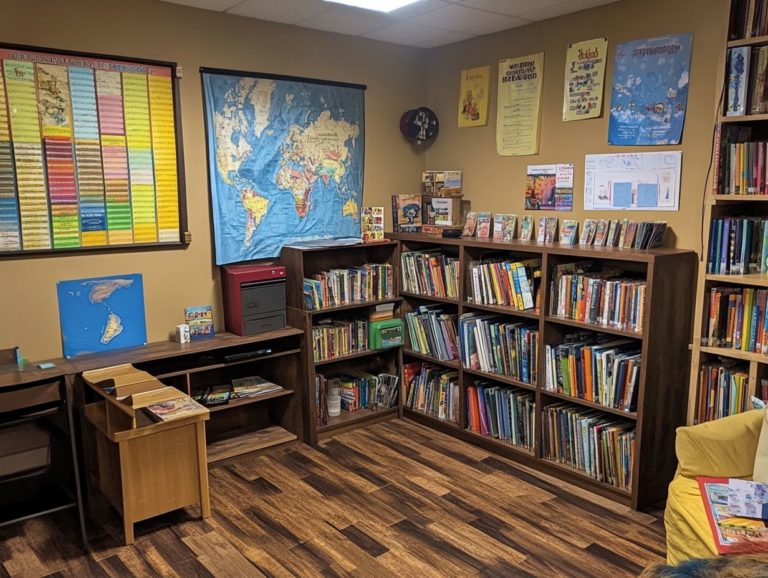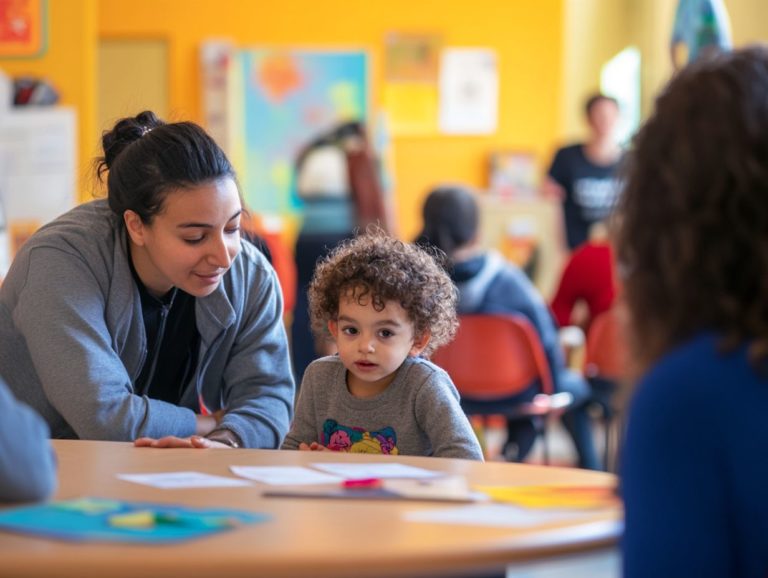how to use literature in language immersion
Literature possesses a remarkable power in language immersion, acting as both a bridge and a backdrop for your learning journey.
By incorporating narratives, poetry, and prose into your language lessons, you can significantly enhance comprehension, broaden your vocabulary, and deepen your grasp of grammar.
This exploration delves into the transformative role literature plays in language learning, providing you with insights on selecting the right texts, implementing effective strategies, and overcoming common challenges.
Uncover how literature can enrich your language immersion experience and elevate your skills to new heights.
Contents
- Key Takeaways:
- The Role of Literature in Language Immersion
- Choosing Appropriate Literature for Language Immersion
- Incorporating Literature into Language Immersion Lessons
- Using Literature to Enhance Language Skills
- Assessing Progress through Literature
- Overcoming Challenges in Using Literature for Language Immersion
- Frequently Asked Questions
- What is literature in language immersion?
- Why is literature important in language immersion?
- How can I incorporate literature into language immersion lessons?
- What types of literature are suitable for language immersion?
- How can I assess students’ understanding of literature in language immersion?
- Are there any resources available for using literature in language learning?
Key Takeaways:

- Literature can enhance language immersion by providing a rich and engaging learning experience.
- When choosing literature for language immersion, consider factors such as language level, cultural relevance, and student interests.
- Strategies like read-alouds, role-playing, and guided discussions can effectively incorporate literature into language immersion lessons.
The Role of Literature in Language Immersion
The integration of literature into language immersion programs creates a lively connection between literary texts and meaningful language acquisition. This approach highlights the importance of context in language immersion, allowing you, as a language teacher, to harness the power of literary works that not only enrich language skills but also deepen cultural understanding among your students.
By immersing themselves in diverse genres and narrative styles, students refine their grasp of language. They also cultivate critical thinking skills that are vital for effective communication.
This varied approach enhances language competence while nurturing personal engagement. It fosters a student-centered learning environment that honors sociolinguistic diversity and elevates the overall language immersion experience.
Benefits of Using Literature in Language Learning
The benefits of incorporating literature into your language learning journey are truly diverse. You can see advancements in language skills, enhanced cultural enrichment, and deeper engagement through methods like the reader-response approach, which encourages personal interaction with texts.
Exploring a variety of literary texts not only expands your vocabulary but also provides valuable insights into different grammatical constructions. This exposure allows for improved sentence structure and stylistic choices, refining your communication abilities.
Engaging with the complexities of narratives encourages critical thinking. You can analyze themes, character motivations, and cultural contexts, fostering a personal connection with the material. This connection elevates your motivation and makes the learning experience even more rewarding.
Ultimately, literature serves as a catalyst for comprehensive language development, enriching your experiences and enhancing your ability to express yourself with confidence.
Choosing Appropriate Literature for Language Immersion
Selecting the right literature for language immersion is essential. This process requires careful evaluation of genres, cultural context, and the language resources accessible to both educators and learners.
By making these thoughtful considerations, you can enhance the effectiveness of your language learning initiatives, creating a more enriching experience for everyone involved.
Factors to Consider
When selecting literature for language immersion, consider factors such as the cultural relevance of the texts, the complexity of genres, and your students’ language competence. This careful selection ensures an enriching educational experience.
Engaging your readers in discussions about themes, character development, and moral dilemmas fosters critical thinking and encourages participation an essential element for retention and understanding.
Age appropriateness is crucial; literature that resonates with your learners’ interests and emotional maturity can significantly strengthen their connection to the material.
Additionally, thematic relevance plays a vital role; texts that reflect contemporary issues or relatable challenges can make the reading experience even more engaging.
In this context, you, as a language teacher, serve as a facilitator, bridging the gap between literary works and language skills. By helping your students navigate the text, you enhance their overall proficiency while deepening their appreciation for literature.
As you explore the world of literature in your teaching, remember that it not only fosters language skills but also enriches cultural understanding. Dive in today and discover the transformative impact literature can have on language immersion!
Incorporating Literature into Language Immersion Lessons

Incorporating literature into your language immersion lessons requires a thoughtful blend of strategies and techniques designed to elevate language skills. Additionally, learning how to use movies for language immersion can enhance this experience. It’s essential to keep the focus on student-centered learning, ensuring that students actively engage with the texts.
This approach not only enhances their understanding but also fosters a deeper appreciation for the language itself.
Strategies and Techniques
Using various strategies and techniques, like the reader-response method, can significantly enhance your language skills. This personal engagement makes literature an essential part of effective teaching.
Incorporating specific strategies like role-playing, where you act out scenes from texts, can deepen your understanding and empathy for characters. This leads to richer discussions.
Guided discussions provide a structured format for sharing perspectives, ensuring every voice is heard while sharpening your critical thinking abilities.
Reflective journaling helps you articulate your insights and feelings about the literature. This fosters a personal connection that enhances language development.
These approaches cater to various learning styles, accommodating visual, auditory, and kinesthetic preferences. They also promote a collaborative environment where you can truly thrive.
Using Literature to Enhance Language Skills
Dive into a treasure trove of rich literary texts that can transform your language skills! These works not only elevate your reading and comprehension abilities but also deepen your grasp of vocabulary within their natural context.
It s an enriching experience that transforms language learning into an exploration of the written word.
Improving Reading and Comprehension
Improving your reading and comprehension skills through literary texts involves engaging in active reading practices that foster critical thinking and interpretation. This is all under the guidance of language teachers who facilitate rich discussions and reflection.
By employing techniques such as close reading, which involves carefully examining texts to understand deeper meanings, you ll learn to dissect passages. Pay attention to the nuances in language and structure that deepen your understanding.
Summarization techniques encourage you to condense lengthy texts into key points. This reinforces essential themes and ideas.
Questioning strategies enable you to dig deeper, cultivating a habit of inquiry that leads to more profound insights.
Regular comprehension checks are vital. They help educators gauge your understanding and provide opportunities for targeted interventions. This ultimately builds your overall language competence and confidence in your reading abilities.
Developing Vocabulary and Grammar
Developing your vocabulary and grammar through literary works allows you to engage with language resources that enhance your understanding of words while applying grammatical rules in practical ways.
By immersing yourself in diverse texts, you can explore vocabulary mapping, which helps you visualize and connect new words to terms you already know. This technique enriches your lexicon and deepens your comprehension of the author’s intent.
Participating in grammar-focused discussions around specific passages enables you to dissect sentence structures and stylistic choices. This reinforces your grasp of language mechanics.
This dynamic interplay between literary exploration and language skill enhancement creates a vibrant learning environment. Here, both your vocabulary and grammar can flourish organically, enabling you to express yourself more articulately in writing and conversation.
Assessing Progress through Literature

To evaluate progress through literature, use effective assessment methods that measure students’ language skills, comprehension of literary texts, and their engagement as active readers in the learning journey.
Effective Evaluation Methods
Effective evaluation methods in language immersion programs can enhance your teaching experience by using the reader-response approach. This allows you to assess not only language competence but also levels of engagement and critical thinking your students demonstrate regarding the literary texts they study.
For instance, when you incorporate self-assessment tools like reflective journals or learning logs, you enable your students to evaluate their own progress and articulate their thoughts on the materials meaningfully. Regular feedback sessions provide opportunities for you to offer constructive guidance, strengthening their linguistic skills and comprehension of narratives.
Formative evaluation is essential, as it fosters an ongoing dialogue between you and your learners. This dialogue ensures that each student’s unique journey toward language acquisition is acknowledged and supported. Such an approach deepens their understanding of the language and nurtures a lifelong love for literature among young learners.
Overcoming Challenges in Using Literature for Language Immersion
Navigating the challenges of utilizing literature for language immersion requires understanding the barriers that can impede effective language acquisition. This includes grappling with the complexities of literary texts and the variety of languages and dialects spoken in the classroom, as well as using music to enhance language immersion.
By recognizing these factors, you can better facilitate a richer and more engaging learning experience.
Addressing Potential Difficulties
Addressing challenges in language learning through literary texts calls for thoughtful planning. Ensure every student has access to the necessary language resources and support. Building a supportive framework, such as incorporating guided reading sessions, can significantly enhance comprehension.
Using supplementary materials like audio recordings or visual aids allows your students to engage with the text dynamically. Adapt texts to cater to varied proficiency levels, making literature more inclusive and approachable for all learners.
Create an encouraging atmosphere now; it empowers students to embrace challenges, ask questions, and develop a deeper appreciation for both language and literature.
Frequently Asked Questions
What is literature in language immersion?

Literature in language immersion refers to using written works like books, poems, and plays as tools for teaching and learning a second language. However, there are also creative methods, such as using sports for language learning immersion, that can serve as valuable resources for language immersion programs, exposing students to authentic language use and cultural elements of the target language.
Why is literature important in language immersion?
Literature is your gateway to authentic language use and cultural insights! It provides a rich source of language input for immersion students, exposing them to a wide range of vocabulary, grammar structures, and cultural contexts. Additionally, it helps develop reading and critical thinking skills in the second language.
How can I incorporate literature into language immersion lessons?
There are several ways to use literature in language immersion lessons. Read the story aloud and have students follow along, provide comprehension activities, discuss cultural elements, or have students act out scenes from the book. For further insights on how to use literature in language learning, choosing texts that align with your students’ proficiency levels is also beneficial.
What types of literature are suitable for language immersion?
Any written work appropriate for the age and language level of the students can be used in language immersion. This includes children’s books, short stories, novels, and poetry. Choose exciting literature that captures your students’ imaginations and is culturally relevant to the target language.
How can I assess students’ understanding of literature in language immersion?
Assessment can be done through various activities such as comprehension questions, written responses, or role-playing activities. You can also have students create their own versions of the story in the target language. Use a mix of formative and summative assessments to gauge students’ progress.
Are there any resources available for using literature in language learning?
Yes, many resources can help incorporate literature into language learning lessons. For example, Storybooks Canada and StoryWeaver provide various children’s books in multiple languages.
Consult language teachers and attend workshops to discover effective literature strategies. Explore these resources to transform your language classes!






